Tony Zhou
-
Watch: Tony Zhou on Marvel’s Lackluster Scores and Temp Track Mediocrity
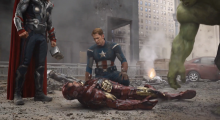
In this video essay, Tony Zhou gets deep into why the Marvel Connected Universe — the highest-grossing franchise of all time — sports not one memorable musical theme that people can recall. The answer involves a crippling dependency on temp tracks bordering on the potentially lawsuit-worthy, making this a good look at the general state of Hollywood musical scores beyond the MCU.
by Filmmaker Staff on Oct 27, 2016 -
Watch: Tony Zhou on “How Does an Editor Think and Feel?”
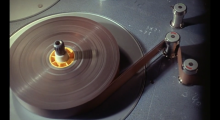
In Tony Zhou’s latest video, the question isn’t how editing is done technically, it’s how it feels. What does it mean to feel an emotion, and how much time does that take to register? Breaking down sequences from Hannah and Her Sisters and The Empire Strikes Back, among others, Zhou dives into the intangibles and instinctual particulars of editorial timing. With interview cameos from, among others, Michael Kahn, Walter Murch and Thelma Schoonmaker.
by Filmmaker Staff on May 12, 2016 -
Watch: Tony Zhou on the Coen Brothers’ Use of Shot/Reverse Shot
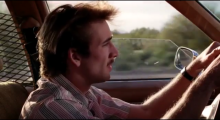
Tony Zhou covers a lot of ground in his latest video essay, which examines the Coen brothers’ use of shot/reverse shot. Noting that they prefer to film conversations from the middle rather than over the shoulder with a long lens, he finds an appropriate video interview with Roger Deakins that discusses his lens preference. Then it’s on to framing, how the characters are defined by their environments, and the emotional effect of these shot choices: both uncomfortable and funny, Zhou concludes.
by Vadim Rizov on Feb 25, 2016 -
“Too Much Coverage is Exhausting, Especially for the Actors”: Tony Zhou on Ensemble Staging
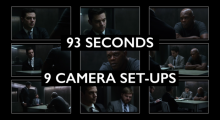
Tony Zhou’s latest begins with a few stern words from Samuel L. Jackson about his intense dislike for having to repeat his performance over and over for multiple angles of coverage. Given that The Hateful Eight is nothing if not an exercise in ensemble staging, it’s timely that that’s the intro for Zhou’s examination of how this technique works in Bong Joon-ho’s masterful Memories of Murder. Much to chew on here, as ever.
by Filmmaker Staff on Jan 5, 2016 -
Watch: Tony Zhou’s “Vancouver Never Plays Itself”
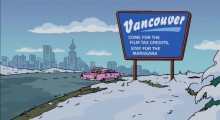
Vancouver is the third-biggest filmmaking city in North America, and yet it’s always a stand-in for somewhere else: New York, Shanghai and San Francisco are all possibilities. What does it mean to be “ubiquitous and invisible” at the same time? In his latest video essay, Tony Zhou examines the many tricks used to disguise the city (from planting USA Today newspaper stands everywhere to making sure the camera looks down outside, lest it accidentally capture mountains that don’t belong to the city), then issues a stirring call for Vancouver to, for once, play itself.
by Vadim Rizov on Sep 15, 2015 -
Watch: The Evolution of Chuck Jones
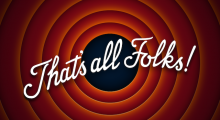
Before Pixar, there was Warner Brothers — or more specifically, there was Chuck Jones. The latest in Tony Zhou’s “Every Frame a Painting” series examines how the animator utilized discipline and restrictions to create his iconic cartoons; how he enmeshed character traits into a simple comedic games of assumption and reality; how minimalism was his strong suit and more.
by Sarah Salovaara on Jul 16, 2015 -
Watch: Tony Zhou In Praise of Chairs

Video essayist Tony Zhou recently griped about the preponderance of Fincher, Scorsese, Anderson, Nolan, etc. dissections, and has since turned his efforts to more unusual facets in film history. His latest video, for instance, explores the role of the chair — or, an extension of the production designer — in storytelling. With a wide range of clips, he interrogates the furniture as a conduit for a person, a situation, and the filmic context.
by Sarah Salovaara on May 29, 2015 -
Watch: Lynne Ramsay Through Details

The latest in Tony Zhou’s Every Frame a Painting series centers on a filmmaker who is relatively unscrutinized in the realm of the video essay: Lynne Ramsay. Though Ramsay’s films turn on watershed moments in the lives of her characters, she often chooses to relate their emotional impact through a string of details, rather than a single overblown reaction. Such a notion is the subject of Zhou’s essay, “The Poetry of Details,” wherein he dissects Ramsay’s use of framing and repetition.
by Sarah Salovaara on May 8, 2015 -
Watch: Tony Zhou on F For Fake and How to Structure a Film
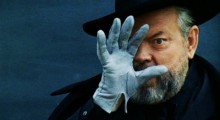
“‘Therefore’ and ‘but;’ ‘meanwhile’ and ‘back at the ranch.’” Those are two storytelling axioms to keep in mind, suggests Tony Zhou, when structuring both a film and a video essay. Drawing on Orson Welles’ F For Fake, as well as the words of Alfred Hitchcock and Trey Parker, Zhou demonstrates how the juggling of parallel ideas and story lines are essential to any convincing film or argument.
by Sarah Salovaara on Mar 31, 2015 -
Why Kurosawa Was a Master of Movement
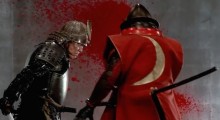
Here’s another masterful film essay by Tony Zhou, this time on Akira Kurosawa’s use of movement in his films. Movement, you ask? Aren’t movies motion pictures and, thus, constructed around movement? Well, as a comparison scene from The Avengers shows, there is movement in the form of listless dolly moves and diffident head tilts, and then there is movement — elegant, multi-point master shots, vibrant background elements like wind and rain, and outsized expressions from actors that can replace pedantic dialogue. I especially like Zhou’s discussion of how Kurosawa cuts from stillness to movement. His appreciation here of Kurosawa has […]
by Scott Macaulay on Mar 22, 2015
